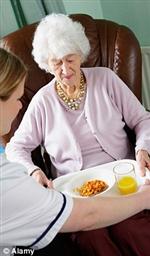Nausea – What Can We Do on the Food Front?
It can be quite frightening when you are faced with a resident who has stopped eating or who is eating very little. One of the most difficult things to address is nausea. Nausea may be a result of an illness, the pain of an accident or surgery, a side effect of a medication or treatment or it may be caused by anxiety. Doctors may prescribe an anti-nausea medication but what can be done on the food front?
Some simple dietary changes may also combat nausea:
Firstly it is important that the resident is relaxed and comfortable before starting to eat a meal. Make sure they are propped up in bed or settled in the dining room away from smells, disruption and noise.
Make sure they are propped up in bed or settled in the dining room away from smells, disruption and noise.
Although it is good to rest after meals it is not a good idea to lie down flat immediately after eating.
Food should be chewed well and eaten slowly.
Small serves and frequent low fat meals and snacks are often beneficial.
Mindless nibbling through the day may assist. It is important not to miss meals as a steady intake of food, especially a food that is high in carbohydrate, helps to maintain the blood glucose level and prevent the breakdown products of weight loss, such as ketones, that can make the nausea worse. It is important not to skip meals and snacks and to encourage the resident to eat before he or she gets too hungry.
Residents often find that their appetite is better in the morning and that breakfast is often the meal that is best received. Take advantage of this and encourage him or her to eat more at that meal.
Cool foods that don’t smell such as salads, sandwiches and cheese and crackers are often more appealing to the resident with nausea. Dining rooms should be well ventilated and away from strong food smells. Avoid foods such as coffee with strong odours.
 Fatty, greasy foods and spicy foods can also be a problem and are best avoided. On the other hand salty foods eg crackers, nuts, crisps and other salty snacks, and foods that are sour or tart such as citrus fruit may be better accepted.
Fatty, greasy foods and spicy foods can also be a problem and are best avoided. On the other hand salty foods eg crackers, nuts, crisps and other salty snacks, and foods that are sour or tart such as citrus fruit may be better accepted.
Offer foods that are high in carbohydrate such as toast, pasta, potato and canned fruits and light meals based on white meats such as chicken and fish.
Some people manage better with liquids such as nutritious soups or drinks. Slowly sipped apple juice or flat lemonade can help but even better are ginger ale and ginger beer as many people find that ginger helps to settle the nausea. Let all carbonated drinks go flat. It is a good idea to avoid drinks at meals, however, as a full and bloated stomach can make the problem worse. Offer them between meals.
Gentle encouragement is important and many residents who manage to eat a little find, in time, that their appetites slowly return and then they can resume a more normal meal pattern.
Article by Christine Borthwick 0418 437 291

